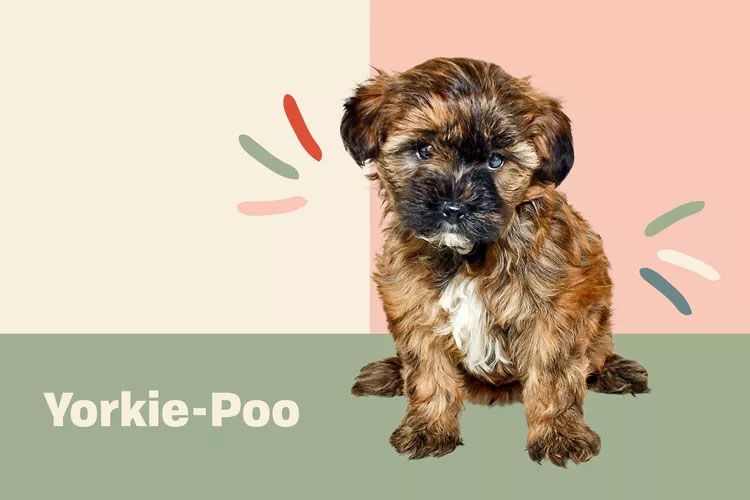
Yorkie-poo Overview
| OFFICIAL NAME | Yorkie-poo |
| COMMON NAME | Yorkie-poo |
| PET HEIGHT | 7 to 15 inches |
| PET WEIGHT | 5 to 15 pounds |
| LIFESPAN | 10 to 15 years |
| GOOD WITH | cats, children, families, seniors |
| TEMPERAMENT | friendly, gentle, outgoing, playful |
| INTELLIGENCE | high |
| SHEDDING AMOUNT | infrequent |
| EXERCISE NEEDS | low |
| ENERGY LEVEL | active |
| VOCAL LEVEL | frequent |
| DROOL AMOUNT | low |
| BREED GROUP | hybrid |
| BREED SIZE | small (0-25 lbs.) |
| COAT LENGTH | curly, wiry |
| COLORS | black, blue, brown / chocolate / liver, cream, gray |
| PATTERNS | bicolor, blue and tan, sable, tricolor |
| OTHER TRAITS | apartment-friendly, easy to groom, easy to train, good for first-time pet owners, hypoallergenic, strong loyalty tendencies, tolerates being alone |
What is a Yorkie-poo? Sometimes called yorkipoo or Yorkie poo, she's a popular designer crossbreed cutie with sass, spunk, and smarts! As the offspring of a Yorkshire terrier (Yorkie) and a toy poodle or miniature poodle, she has a double dose of energy and wits. Sometimes she doesn't know (or care!) how petite she is and will tap into her inner terrier feistiness to rumble and play with children, cats, and other dogs.
Because a Yorkie-poo bonds so well with her humans, she's quite snugglesome and loves daily brush time. She also responds well to early positive reinforcement training and is eager to try games and tricks, making her a terrific pooch for dedicated first-time pet parents intent on building engaged relationships with their new pups. Yorkie-poos make great dog friends for seniors, too, as 20–30 minutes of exercise each day helps them stay at the peak of health.
Appearance
Breeders responded to a demand for more hypoallergenic dogs by creating the hybrid Yorkie-poo, because the combination of Yorkies' silky coats and most poodles' soft, curly fur supposedly causes less reaction in people with animal allergies.As the Mayo Clinic points out, there's really no such thing as a hypoallergenic dog. All canines produce Can f 1, a common protein found in urine, saliva, and skin debris known as dander, and this is what aggravates an individual's immune response. However, with her parentage, it's possible a Yorkie-poo will be less likely to cause sniffles and sneezes in some people.
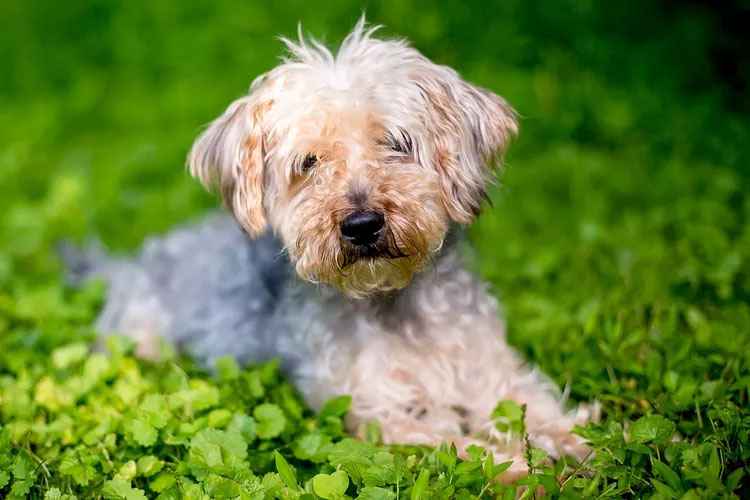
Yorkie-poos also inherit an attractive cornucopia of coat patterns and colors. When you scroll through various Yorkie-poo pictures, some dogs have the typical bicolor or tricolor pattern of a Yorkie featuring black, brown, blue, gray, red, gold, and tan. Others pick up more solid hues from a poodle, such as black, rust, brown, gray, beige, and white. Coat texture might vary, too—often sleek and fluffy, but occasionally a tad coarse and scruffy or glossy and smooth.
Most Yorkie-poos have inky-black boopable noses and twinkling brown eyes that are the foundation of their sweet expressions. Their snouts are either slightly long and tapered like poodles or short and pert like Yorkies. You'll notice variance in their ears as well: Some Yorkie-poos have fur poofs framing their faces, while others have perky points on their heads. And on the other end, there's even more variety! Tails can be long plumes, short bobs, or a blend of the two.
Prospective pet parents often wonder, "How big do Yorkie-poos get?" Once again, their lineage determines a lot. The average Yorkie-poo size is 7–15 inches tall at the shoulder and 5–15 pounds. A Yorkie-poo adult with a toy poodle parent is tinier than one with a miniature poodle parent. Body styles differ, too, as some might have slender, petite frames while others display more robust, square shapes.
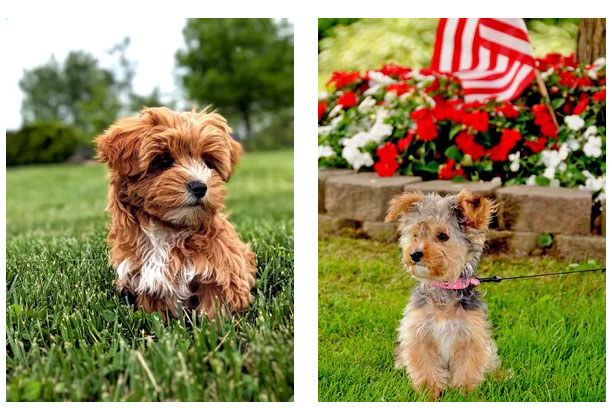
Temperament
"Although they're small, Yorkie-poos are lively and spunky!" says Alicen Tracey, DVM at Den Herder Veterinary Hospital in Waterloo, Iowa, and a member of the Daily Paws Advisory Board.This is truly a charismatic breed overflowing with personality, affection, curiosity and—we'll just say it—a smidgen of bossiness! Like other intelligent small dog breeds, Yorkie-poos can be a little scrappy and like to make their presence known, especially when they're ready to play or want to try a new trick.
Spritely Yorkie-poos thrive when they have consistent mental and physical stimulation and proper boundaries. "It's important to start behavior training with Yorkie-poos when they're young and provide them with a lot of positive experiences," Tracey says. Fortunately, they're easy to train and have a genuine fondness for being with their people.
Puppy kindergarten is a terrific way to help your new dog learn essential socialization skills, especially if she's in a home with children. Pet parents of pups usually wait until after vaccinations to start these classes. Tracey also recommends certain aspects of touch with a Yorkie-poo puppy to help her become more acclimated to being handled. "As with any small breed dog, it's important to get them used to you playing with their feet, messing with their ears, and having them be held in different positions when they're young," she says. "This not only provides them with exposure to make them comfortable in different situations, but also allows you the opportunity to examine them closely in case of health concerns."
As Yorkie-poos get older, advance to other forms of training to build additional skills and reinforce proper behaviors. Yorkshire terriers and poodles are both active in various canine activities such as obedience, agility, rally, and barn trials, so it's possible your Yorkie-poo will love spending time with you in these ways, too. While more patience and care may be required to establish trust and train adopted or rescue Yorkie-poos, the time and effort will be worth it to help her become happy and proud of her achievements.
Early positive reinforcement training also helps you curb a particular pesky Yorkie-poo trait: She likes to bark. A lot! Sometimes, she's conveying an important message, such as a stranger at the door. Although Yorkie-poos are generally friendly to almost everyone, they're also highly alert and protective of their humans. Or she might just be saying "HI–HI–HI!" to see if you're paying attention. Clicker training with treats and proper cues allows you to manage this characteristic more effectively.
Living Needs
Generally, a Yorkie-poo isn't fussy. If you're comfortable in the house, she probably is, too. But no matter how fluffy her fur might be, make sure to invest in proper booties and sweaters to help her manage cold weather walkies.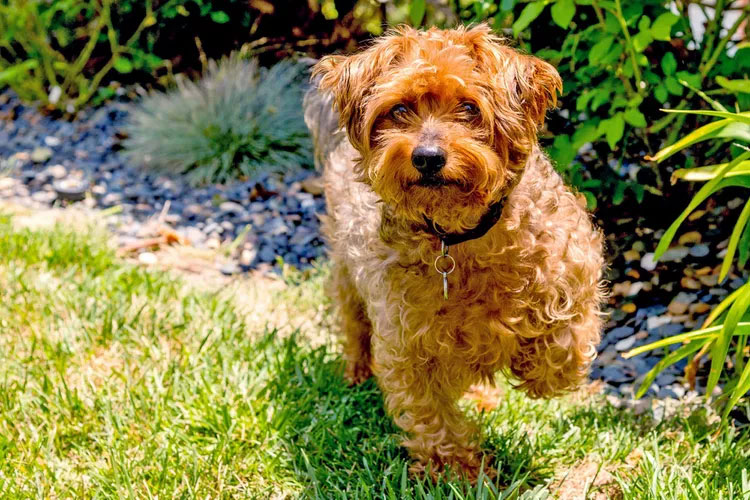
She can adapt to almost any situation, whether a suburban backyard or an urban dog park. "Yorkie-poos would make great apartment dogs," Tracy says. "However, they still require dedicated time to meet their energy requirements—at least one walk per day and dedicated play time." Because Yorkie-poos have a lot to say, consider training right away to reduce the level of unnecessary barking before moving her to a shared wall dwelling.
Yorkshire terriers were once bred for rat elimination, so your Yorkie-poo might inherit an instinct to chase after small creatures, sometimes referred to as a prey drive. Good training and playtime in proper fenced areas will help you establish better control over the environment so she doesn't dart off. Leash training, especially if your Yorkie-poo will be around larger dogs in public areas, is also important for her safety. Remember, this playful pooch often thinks she's bigger than she is!
Care
Because a Yorkie-poo might inherit the hair-like coat of her Yorkie parent or the wiry fur of her poodle parent, it's difficult to estimate how much she might shed. Most Yorkie-poos shed a little bit, especially during the spring and fall, so maintain a daily brushing routine to keep her coat in fine shape and control the floof. This also helps reduce dander, which might be helpful to minimize allergens.Tracey says Yorkie-poos require routine grooming that entails both bathing and hair trimming, too. This doesn't mean your pooch is high maintenance, though—the degree of grooming may change depending on the type of coat your pup inherits. If your Yorkie-poo has more of a poodle style, visits to a professional groomer every 6-8 weeks will keep her looking spiffy. You can probably handle nail trimming at home, but a groomer can do that as well.
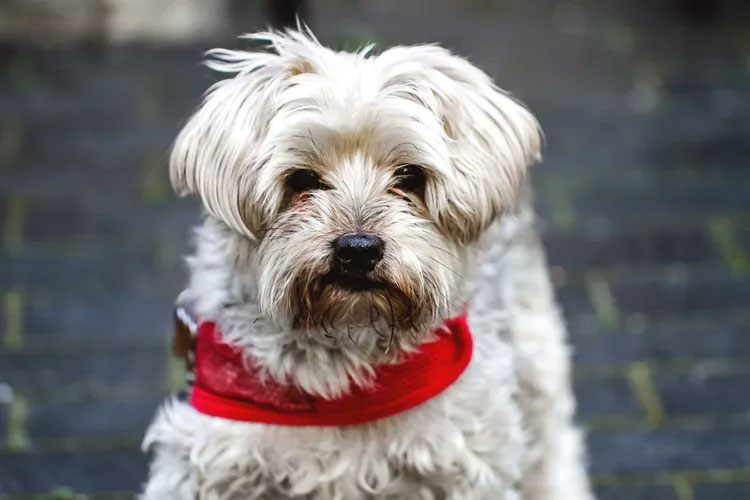
Since small breed dogs like Yorkie-poos are prone to dental disease, Tracey also advises regular home dental care and annual vet checkups. "The best way to prevent dental disease is daily brushing with canine safe toothpaste and a toothbrush," she says. "However, annual dental cleanings at a veterinary office are important as well to clean off the calcified tartar that routine brushing cannot get rid of."
Health
Your lovable Yorkie-poo's lifespan could be as long as 15 years, so you want to develop a good healthcare plan with your veterinarian to ensure she lives well. To do this, it's important to understand more of the specifics of crossbreeding dogs.Patrick Singletary, DVM, owns Good Dog Veterinary Care in Marietta, Ga. He says the basic concept of breeding and genetics is that the strongest traits (phenotype) from the mom and dad will be passed on to the offspring.
"Dogs have 39 chromosomes," he says. "When a male and a female are bred, they have to pass along 20,000 genes that will be carried on all 39 chromosomes for each of their puppies. These genes make up the genotype. There will also be bad genes passed along, which leads to specific health problems in certain breeds. These 'bad genes' are passed down from generation to generation."
Singletary says that when he talks with a client about health concerns to be aware of in their Yorkie-poo dog, he discusses both parent breeds, because there's no way to predict which genes are passed on to the pup.
So while a Yorkie-poo is usually rather healthy, it's vital to know what contributes to her medical history:
According to the Poodle Club of America, this breed is prone to Addison's disease, which affects the adrenal glands; endocrine diseases such as Cushing's syndrome and diabetes; and bloat.
The Yorkshire Terrier Club of America indicates key health problems for this breed might include a liver condition called hepatic microvascular dysplasia; the spinal disease degenerative myelopathy; and various eye issues.
Singletary also says both breeds could have joint issues, such as hip dysplasia and patella luxation, which is when the kneecap slips out of place. According to VCA Hospitals, many small and toy dog breeds have a genetic predisposition for luxating patella.
Tracey adds that Yorkie-poos, like many small breeds, can also have trouble with collapsing trachea, which causes irritation and coughing; as well as a heart condition known as degenerative mitral valve disease.
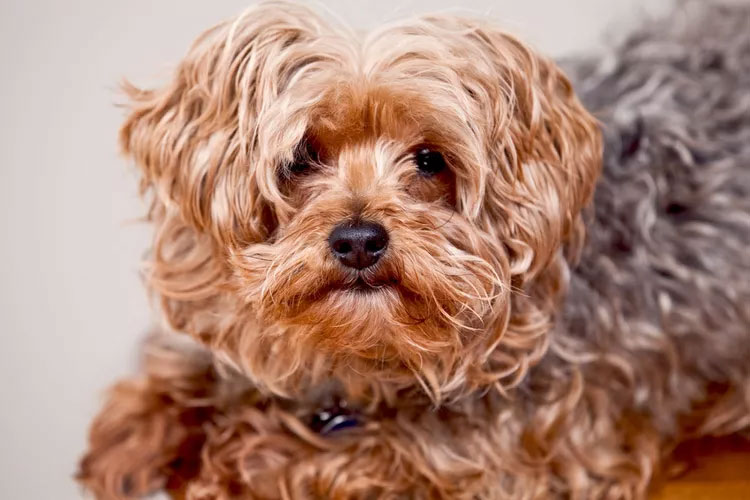
History
Yorkie-poos are believed to be the result of the designer crossbreed trend that's skyrocketed in the past 20 years."In genetics, F1 hybrid refers to a breeding of two individuals to create a crossbreed or hybrid," Singletary says. "For instance, a Yorkshire terrier bred with a miniature poodle will produce an F1 offspring, the Yorkie-poo. F2 hybrid is created from breeding two F1 hybrids together—breeding an F1 hybrid Yorkie-poo with another F1 hybrid Yorkie-poo to create an F2 Yorkie-poo. Knowing these intricacies is important because of inbreeding."
Because of the potential for hypoallergenic benefits, Yorkie-poos are in high demand. So Singletary says it's important to do your research when choosing a new pup, especially when evaluating breeders and Yorkie-poo costs.
"Selecting any dog should be done over months to years, depending on the time someone has to devote to research and vetting a breeder," Singletary says. This is especially true for hybrid breeds. "I feel breeders should strongly vet their prospective puppy owners as well. If the breeder is asking you tough questions, then they're likely passionate about what they do and have the health and wellness of their dogs at the forefront of their minds."
While he believes a lot of knowledge, passion, and time goes into creating and maintaining a successful breeding operation, "there are also some awfully inflated prices for hybrid dogs." He advises consulting a theriogenologist (reproductive specialist) or a dog-specific veterinarian to gain knowledge about what to ask breeders and what to look for in certain hybrid lines.
Beware of "too good to be true" Yorkie-poos, because many designer crossbreeds are the product of puppy mill schemes. This means they might not be born into a healthy environment that focuses on their well-being. Here are some warning signs of a potential puppy scam:
A website states specific wait times for puppies.
A breeder offers multiple mixed breeds for sale.
You're not allowed to visit the breeder, or don't receive satisfactory answers to your questions about their lines of dogs.
A breeder offers to ship puppies.
The breeder's website has vague contact information, such as no phone number, no email, doesn't offer video or in-person previews of your pup and her environment, and so on.
Fun Facts
Actress and singer Demi Lovato's adopted black Yorkie-poo, Batman, often makes an appearance on her Instagram page along with snowy pup sibling Cinderella. Batman was even nominated for the iHeart Radio "Cutest Musician's Pet" award in 2018, but lost to Ariana Grande's Toulouse, a beagle-Chihuahua mix.You might find this floofy designer crossbreed referred to as yorkipoo, yorkiepoo, yorki-poo, yorki poo, yorkiedoodle, and even yo-yopoo.